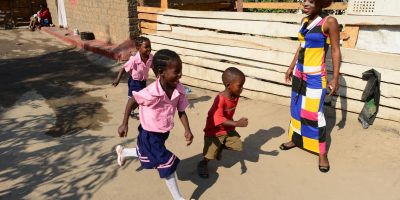Search
Search within Trypanosomiasis
13 results found
Journal Article
Structural drivers of vulnerability to zoonotic disease in Africa
This paper analyses three case studies—trypanosomiasis in Zimbabwe, Ebola and Lassa fever in Sierra Leone and Rift Valley fever in Kenya — to argue that addressing the underlying structural drivers of disease vulnerability is essential for a ‘One Health’ approach…
Journal Article
Clinical trials as disease control? The political economy of sleeping sickness in the Democratic Republic of the Congo (1996-2016)
Human African Trypanosomiasis (HAT), commonly known as sleeping sickness, is closer than ever to being eliminated as a public health problem. We analyse archives and in-depth interviews to explore the role the national HAT programme played in the Democratic Republic…
Journal Article
‘Where are the dead flies!’: perceptions of local communities towards the deployment of Tiny Targets to control tsetse in the Democratic Republic of the Congo
The National Programme for the control of human African trypanosomiasis in Democratic Republic of Congo includes a large-scale vector control operation using Tiny Targets. These are small panels of insecticide-impregnated cloth that are deployed in riverine habitat where tsetse flies…
Journal Article
Human African trypanosomiasis (HAT) in the Republic of Congo: why the Congolese population is reluctant to screening?
Human African trypanosomiasis (HAT) is a neglected tropical infection, and surveillance of the disease relies on community participation in screening. This study aimed to identify the main factors associated with low community uptake of HAT screening in endemic districts in…
Journal Article
Communities’ Perception, Knowledge, and Practices Related to Human African Trypanosomiasis in the Democratic Republic of Congo
Community members see their role more in terms of vector control than participation in screening, referral, or accepting treatment. We propose recommendations for achieving sustainable community engagement, including development of an information and communication strategy and empowerment of communities to…
Journal Article
Sensing Sleeping Sickness: Local Symptom-Making in South Sudan
Programs for neglected tropical diseases (NTDs) such as sleeping sickness increasingly involve patients and community workers in syndromic case detection with little exploration of patient understandings of symptoms. Drawing on concepts from sensorial anthropology, I investigate peoples’ experiences of sleeping…
Journal Article
Deadly Flies, Poor Profits, and Veterinary Pharmaceuticals: Sustaining the Control of Sleeping Sickness in Uganda
Efforts to control neglected tropical diseases have increasingly focused on questions of implementation. But how should we conceptualize the implementation process? Drawing on ethnographic fieldwork between 2010 and 2012, in this article I explore efforts by a small-scale public–private partnership…
Journal Article
Challenges of controlling sleeping sickness in areas of violent conflict: experience in the Democratic Republic of Congo
Human African trypanosomiasis (HAT), or sleeping sickness, is a fatal neglected tropical disease if left untreated. HAT primarily affects people living in rural sub-Saharan Africa, often in regions afflicted by violent conflict. Screening and treatment of HAT is complex and…
Journal Article
Clinical trials as disease control? The political economy of sleeping sickness in the Democratic Republic of the Congo (1996–2016)
Human African Trypanosomiasis (HAT), commonly known as sleeping sickness, is closer than ever to being eliminated as a public health problem. The main narratives for the impressive drop in cases allude to drugs discovery and global financing and coordination. They raise questions…
Blog
Humanitarian diagnostics for sleeping sickness in Uganda
A key impetus for the invention of a Rapid Diagnostic Test (RDT) for sleeping sickness (also known as human African trypanosomiasis or HAT) was the persuasive advocacy for better ‘field ready tools’ by medical humanitarian agencies such as Médecins Sans…
Journal Article
Experiences of the one-health approach by the Uganda Trypanosomiasis Control Council and its secretariat in the control of zoonotic sleeping sickness in Uganda
Elimination of sleeping sickness from endemic countries like Uganda is key if the affected communities are to exploit the potential of the available human and livestock resources (production and productivity). Trypanosoma brucei rhodesiense, the parasite that causes acute sleeping sickness…

Evidence Reviews
Research Update and Situation Analysis – Zambia
The Dynamic Drivers of Disease in Africa Consortium is an ESPA1-funded research programme designed to deliver much-needed, cutting-edge science on the relationships between ecosystems, zoonoses, health and wellbeing with the objective of moving people out of poverty and promoting social…


